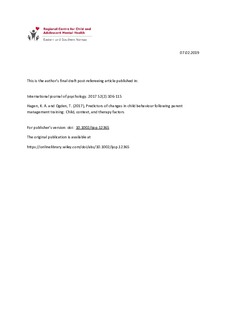| dc.contributor.author | Amlund Hagen, Kristine | |
| dc.contributor.author | Ogden, Terje | |
| dc.date.accessioned | 2019-02-07T12:38:33Z | |
| dc.date.available | 2019-02-07T12:38:33Z | |
| dc.date.issued | 2017 | |
| dc.identifier.citation | International journal of psychology. 2017 52(2):106-115 | nb_NO |
| dc.identifier.issn | 0020-7594 | |
| dc.identifier.issn | 1464-066X | |
| dc.identifier.uri | http://hdl.handle.net/11250/2584354 | |
| dc.description.abstract | This non-randomised study examined a set of predictive factors of changes in child behaviour following parent management training (PMTO). Families of 331 Norwegian girls (26%) and boys with clinic-level conduct problems participated. The children ranged in age from 3 to 12 years (Mage = 8.69). Retention rate was 72.2% at post-assessment. Child-, parent- and therapy-level variables were entered as predictors of multi-informant reported change in externalising behaviour and social skills. Behavioural improvements following PMTO amounted to 1 standard deviation on parent rated and ½ standard deviation on teacher rated externalising behaviour, while social skills improvements were more modest. Results suggested that children with higher symptom scores and lower social skills score at pre-treatment were more likely to show improvements in these areas. According to both parent- and teacher-ratings, girls tended to show greater improvements in externalising behaviour and social skills following treatment and, according to parents, ADHD symptomology appeared to inhibit improvements in social skills. Finally, observed increases in parental skill encouragement, therapists' satisfaction with treatment and the number of hours spent in therapy by children were also positive and significant predictors of child outcomes. | nb_NO |
| dc.language.iso | eng | nb_NO |
| dc.title | Predictors of changes in child behaviour following parent management training: Child, context, and therapy factors | nb_NO |
| dc.type | Journal article | nb_NO |
| dc.subject.nsi | VDP::Medisinske Fag: 700::Klinisk medisinske fag: 750::Psykiatri, barnepsykiatri: 757 | nb_NO |
| dc.source.pagenumber | 106-115 | nb_NO |
| dc.source.volume | 52 | nb_NO |
| dc.source.journal | International journal of psychology | nb_NO |
| dc.source.issue | 2 | nb_NO |
